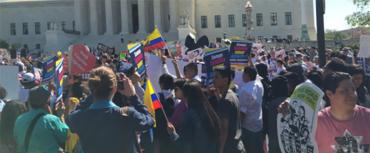
The U.S. Supreme Court seemed to be divided on whether the president overstepped his authority in signing the orders to shield millions of immigrants from deportation after hearing oral arguments in a case against the measures Monday.
The U.S. Supreme Court heard oral arguments in the case against President Barack Obama’s 2014 executive order to protect immigrants and make them eligible to work in the United States.
Twenty-six states joined Texas in a suit against the policies, alleging the president overstepped his authority by signing the executive orders into law. In 2014, President Barack Obama signed an executive order greatly expanding immigration policies in the United States. The two acts, the Deferred Action for Childhood Arrivals and the Deferred Action for Parents of Americans, would protect roughly 4 million immigrants nationwide.
Conservative justices expressed several concerns on the orders on Monday, questioning whether the Obama administration actually had the authority to defer deportations.
Liberal justices seemed to be more sympathetic towards the Obama administration’s policies, noting the U.S. has over 11 million undocumented immigrants and these programs would provide funds for removing about 4 million of them.
"They are here whether we want them or not," said Justice Sonia Sotomayor.
Meanwhile, immigrants gathered around the steps of the U.S. Supreme Court in support of the Obama’s executive action. They shouted “Si se puede,” which means “yes we can,” and waved signs.
Some drove for more than 30 hours just to get to Washington to make sure their voices were heard on the immigration issue. Others arrived to Washington last week and began camping out as early as Friday, just so they could potentially witness a part of history.
DAPA is a planned immigration program which would give deferred action to the parents of children who are either native American citizens or are lawful permanent residents of the United States.
Florida has long been one of the most active places in the country for immigrants due to its proximity to the Caribbean and Central America. A 2013 survey found nearly four million of Florida’s residents were born abroad, or about one in every five people.
Those numbers mean a big impact from local and federal immigration policies. Approximately 229,000 Florida immigrants would be eligible for deportation deferral, work permits, and state driver’s licenses under the immigration programs.
Deferred action doesn't necessarily mean these immigrants would be granted full legal status, but they'd be given a three-year, renewable work permit and would also be exempt from deportation.
The Supreme Court is expected to make a decision on the case in June.
Reach reporter Allison Nielsen by email at allison@sunshinestatenews.com or follow her on Twitter: @AllisonNielsen.


